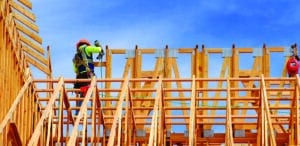President Donald Trump on Thursday postponed 25 percent tariffs on many imports from Mexico and some imports from Canada for a month amid widespread fears of the economic fallout from a broader trade war.
The White House insists its tariffs are about stopping the smuggling of fentanyl, but the taxes proposed by Trump have caused a gaping wound in the decades-old North American trade partnership. Trump’s tariff plans have also caused the stock market to sink and alarmed U.S. consumers.
In addition to his claims about fentanyl, Trump has insisted that the tariffs could be resolved by fixing the trade deficit. He emphasized while speaking in the Oval Office that he still plans to impose “reciprocal” tariffs starting on April 2.
“Most of the tariffs go on April the second,” Trump said before signing the orders. “Right now, we have some temporary ones and small ones, relatively small, although it’s a lot of money having to do with Mexico and Canada.”
Imports from Mexico that comply with the 2020 USMCA trade pact would be excluded from the 25 percent tariffs for a month, according to the orders signed by Trump. Auto-related imports from Canada that comply with the trade deal would also avoid the 25 percent tariffs for a month, while the potash that U.S. farmers import from Canada would be tariffed at 10 percent, the same rate at which Trump wants to tariff Canadian energy products.
The USMCA treaty doesn’t specifically cover Canadian softwood lumber, but the the National Association of Home Builders said it “worked with the White House to ensure [the lumber] was covered under the latest pause on tariff implementation.”
Roughly 62 percent of imports from Canada would likely still face the new tariffs because they’re not USMCA-compliant, according to a White House official who insisted on anonymity to preview the orders on a call with reporters. Half of imports from Mexico that are not USCMA-compliant would also be taxed under the orders being signed by Trump, the official said.
But the National Association of Home Builders said it still expects lumber prices to be higher this year.
And if the tariffs do go into effect next month, the trade group says it would add $3 billion to the cost of critical imported construction materials, from Canadian lumber and Mexican gypsum – used in drywall – to all manner of metal and home appliances from China. Anecdotal reports from NAHB members, the association said, suggest materials costs for each new single-family home could go up by $7,500 to $10,000.
Furthermore, the Trump administration has signaled it plans to double the product-specific tariff rate on Canadian softwood lumber later this year, putting the overall tariff rate on the material above 50 percent. The nation currently imports around 30 percent of its softwood lumber because of limited domestic capacity – capacity that will take time to come online.
Mexico President Claudia Sheinbaum has planned to announce any retaliatory measures on Sunday, but Trump credited her with making progress on illegal immigration and drug smuggling as a reason for again pausing tariffs that were initially supposed to go into full effect in February.
“I did this as an accommodation, and out of respect for, President Sheinbaum,” Trump said on Truth Social. “Our relationship has been a very good one, and we are working hard, together, on the Border.”
Trump’s actions also thawed relations with Canada somewhat, after its initial retaliatory tariffs of $21 billion on U.S. goods. The government said it had suspended its second wave of retaliatory tariffs on additional U.S. goods worth $87 billion.
Trump’s on-again, off-again tariff threats have roiled financial markets, lowered consumer confidence, and enveloped many businesses in an uncertain atmosphere that could delay hiring and investment.
Major U.S. stock markets briefly bounced off lows after Commerce Secretary Howard Lutnick previewed the monthlong pauses on CNBC on Thursday. Significant declines already seen this week resumed within an hour. The S&P 500 stock index has fallen below where it was before Trump was elected.
Asked whether the stock market decline was due to his tariffs, Trump said, “A lot of them are globalist countries and companies that won’t be doing as well because we’re taking back things that have been taken from us many years ago.”
Banker & Tradesman staff writer James Sanna contributed to this report.







